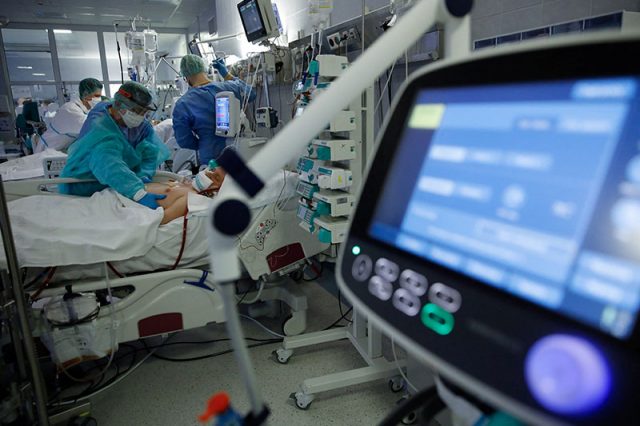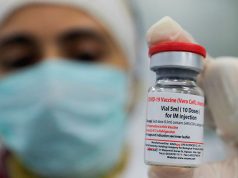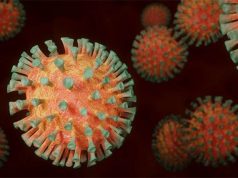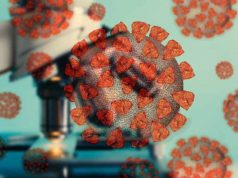
The following is a summary of some recent studies on COVID-19. They include research that warrants further study to corroborate the findings and that has yet to be certified by peer review.
Risk of new heart problems much higher after COVID recovery
Long after recovery from COVID-19, people face significantly higher risks for new heart problems, a large study has found.
Researchers at the U.S. Department of Veterans Affairs compared rates of new cardiovascular problems in 153,760 individuals infected with the coronavirus before vaccines were available, 5.6 million people who did not catch the virus, and another 5.9 million people whose data was collected before the pandemic.
An average of one year after their recovery from the acute phase of the infection, the COVID-19 survivors had a 63% higher risk for heart attack, a 69% higher risk for problematic irregular heart rhythm, a 52% higher risk of stroke, a 72% higher risk of heart failure, and a nearly three times higher risk of a potentially fatal blood clot in the lungs compared with the other two groups, according to a report published on Monday in Nature Medicine.
The elevated risks among former COVID-19 patients were evident in young and old, Blacks and whites, males and females, people with and without diabetes and with and without kidney disease, as well as smokers and nonsmokers, said Ziyad Al-Aly of the VA St. Louis Health Care System and Washington University in St. Louis.
The risks were high even in people who had mild COVID-19 and did not need to be hospitalized for it, he noted in a Twitter thread.
“It really spared no one,” Al-Aly told Reuters.
“People with COVID-19 should pay attention to their health and seek medical care if they experience symptoms like chest pain, chest pressure, palpitation, swelling in the legs, etc.”
mRNA vaccine side effects no worse in cancer patients
COVID-19 vaccines using mRNA technology do not produce any extra short-term side effects in cancer patients, a new study suggests.
Researchers surveyed 1,753 recipients of two doses of the Pfizer/BioNTech vaccine, about two-thirds of whom had a history of cancer and about 12% of whom were receiving chemotherapy, immunotherapy, radiation therapy or surgery for their disease. More than 90% of the cancers involved solid tumors.
The Pfizer vaccine has been shown to work well in such cases. People with and without cancer reported similar rates of pain at the injection site, muscle pain, joint pain, fever, chills, headache, nausea, and fatigue, the research team reported in the Journal of the National Comprehensive Cancer Network.
Overall, post-vaccination symptoms were reported by roughly 73% of patients regardless of whether they had cancer, with pain at the injection site being the most common adverse event.
Earlier studies have found vaccine hesitancy among cancer patients, the researchers noted. The harms of COVID-19 are “compounded for patients with cancer who have refused vaccination,” they said.
“Our data, in combination with those from other sources, show that the mRNA COVID-19 vaccine is well tolerated by patients with a history of cancer, including those receiving active treatment.”
Omicron’s route into cells helps explain symptom profile
The Omicron variant’s method of infecting cells is different from the mechanism most often used by earlier SARS-CoV-2 variants, which could help explain Omicron’s milder symptom profile, a study published in Nature suggests.
Earlier variants use the ACE2 protein on cell surfaces and an enzyme called TMPRSS2 to fuse themselves to the cell membrane and inject their genetic material inside.
Omicron prefers to enter cells by creating tiny sacs in the cell membrane called endosomes that cells use to transport materials internally, researchers found. Omicron still attaches itself to ACE2 proteins, but it does not need help from TMPRSS2.
In fact, Omicron multiplies most readily in tissues where TMPRSS2 is scarce, such as the nose.
In the lungs, where TMPRSS2 is plentiful, Omicron has spread less effectively and caused less damage than earlier variants.
The findings help explain “why the disease is less severe and causes less pneumonia” with Omicron, said Dr. Ravindra Gupta of the Cambridge Institute of Therapeutic Immunology and Infectious Diseases in the UK.
Gupta also noted that drugs targeting TMPRSS2, such as camostat mesylate, a pancreatitis treatment that has shown some benefit in COVID-19 patients, may be less useful with Omicron.
—Reporting by Nancy Lapid and Christine Soares; Editing by Bill Berkrot









